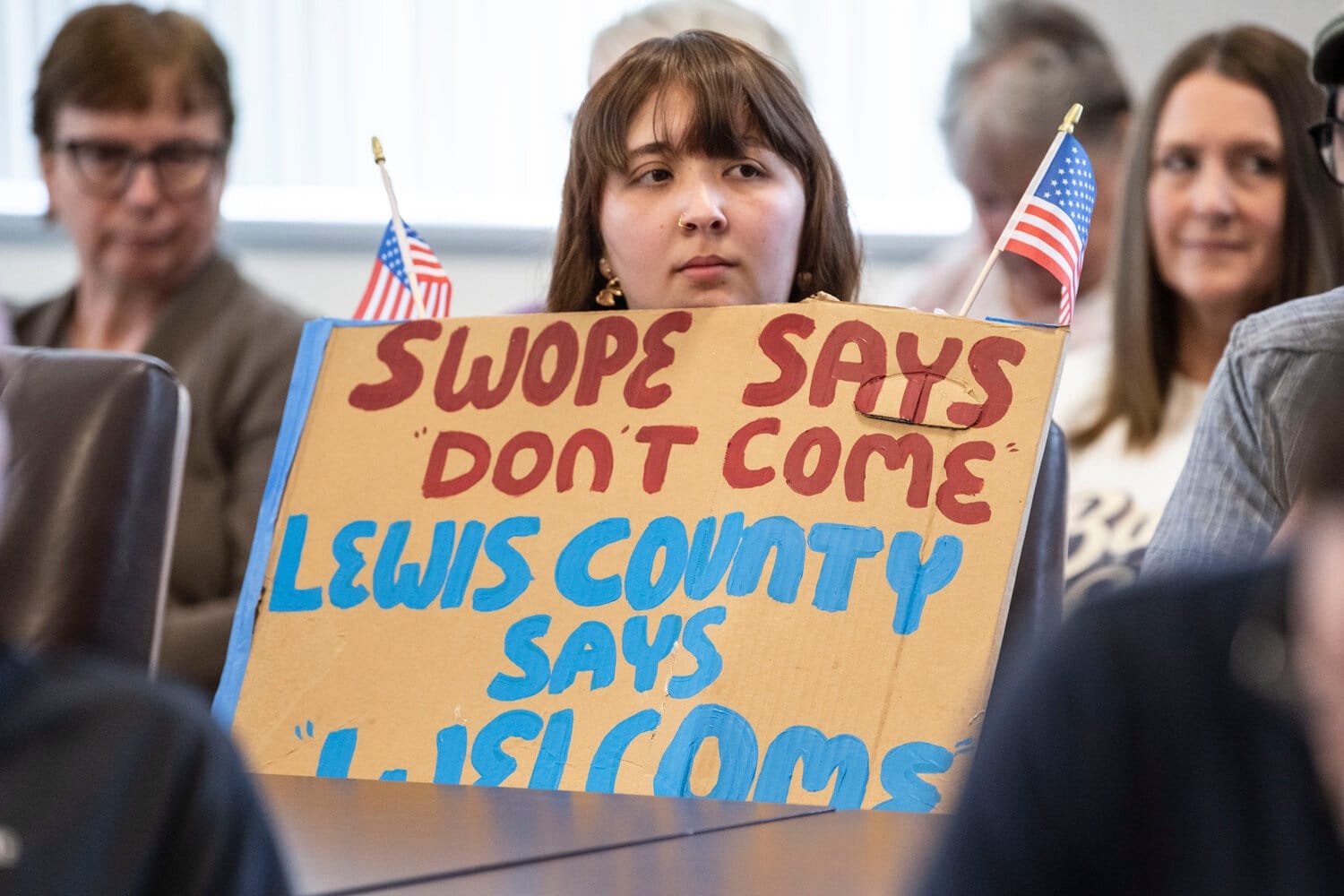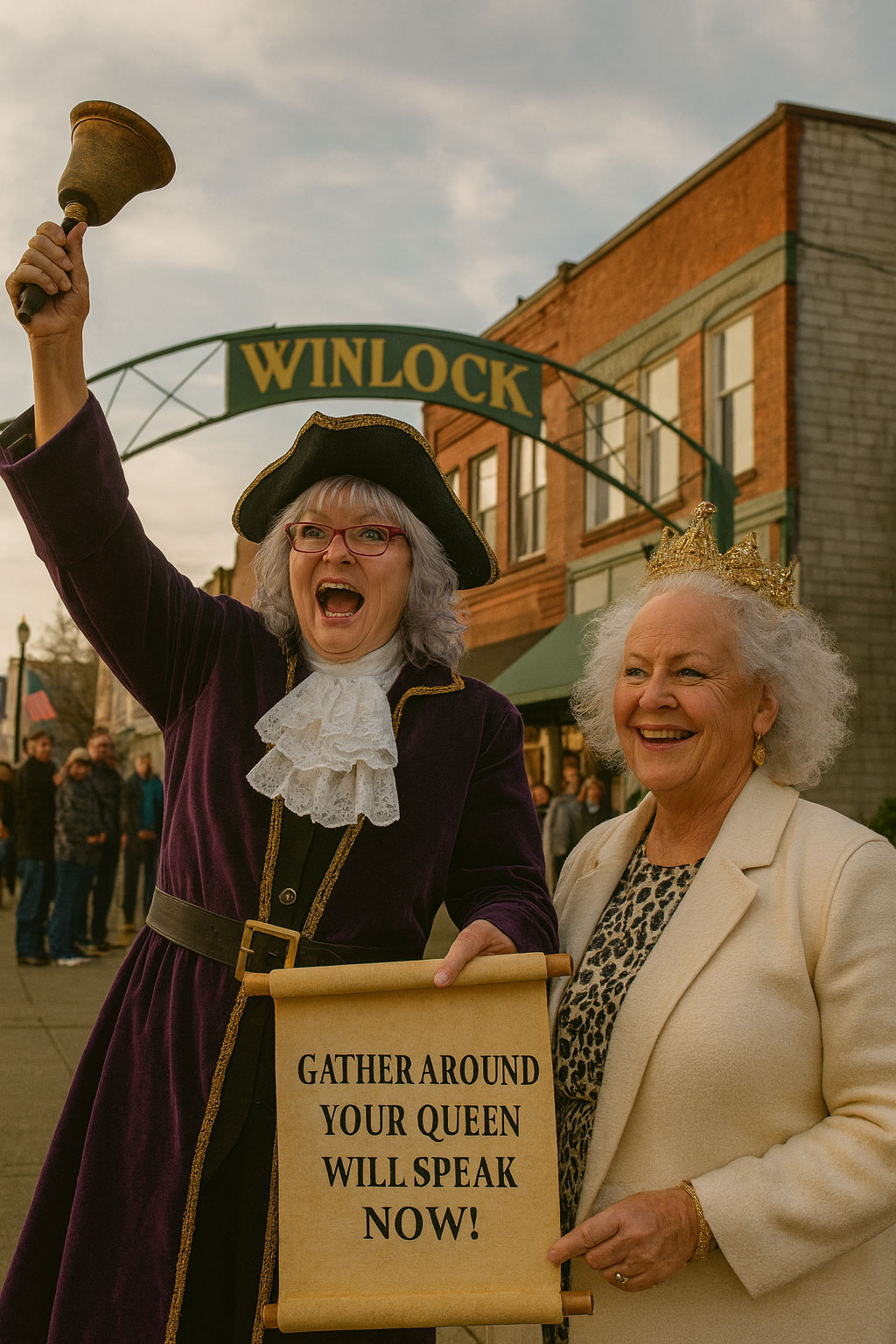Lewis County commissioners approve ‘non-sanctuary’ resolution amid vocal opposition
Commissioner Sean Swope says resolution is needed to preserve federal funding; detractors say it could impede due process for residents and lead to racial profiling
Lewis County has now publicly declared itself a “non-sanctuary” jurisdiction after the Board of Lewis County Commissioners on Tuesday revisited and approved a resolution it first heard at the beginning of June.

Lujan Rodriguez holds a sign that says “Swope says ‘don’t come’ Lewis County says ‘welcome’” during the Tuesday, July 8, business meeting at the Lewis County Courthouse in Chehalis.
Lewis County Commissioners Sean Swope, Scott Brummer and Lindsey Pollock voted unanimously in support of Resolution 25-158 at their business meeting on Tuesday, July 8, at the Lewis County Courthouse in Chehalis.
According to the text of the resolution, it “reaffirms” the county’s position in wanting to cooperate with federal immigration enforcement while complying with Washington state law.
Roughly an hour and a half of public comment ensued before the commissioners passed the policy, with a vast majority of the testimony condemning the resolution. Almost immediately after the passage of the local policy, those opposing the measure erupted in boos and jeers, quickly forming into a chant of “shame” at the commissioners that lasted roughly a minute as people began to filter out of the room.
The commissioners seemed prepared for the event after the last time the resolution appeared on the board’s agenda led to roughly two hours of impassioned public testimony, but stalled after Pollock said she would prefer to have Brummer in attendance. The policy was last heard in early June but did not receive a vote after a motion to vote on the resolution from Swope, who put the resolution forward, failed to receive a second from Pollock. Brummer was absent.
The agenda for this week’s meeting defined a procedure for public comment on the resolution ahead of time. As part of the change, the board addressed its other business items and initial public comment period first before visiting the resolution and hearing public comment. Public comment was limited to two minutes per person instead of the normal three-minute limit. According to a note included in the agenda and read allowed by Clerk of the Board Rieva Lester, the limit was enacted to allow time for testimony from more people.
“Please note that in an effort to ensure as many people as possible can share their views, public comment will be limited to two minutes per person,” she said. “We will delay public comment on proposed Resolution 25-158 until after all of the other topics have been covered. Please also note that we will limit the time devoted to public comment, as allowed per RCW42.30.240. To ensure your voice is heard, we encourage you to submit written comment before the meeting begins.”
Testimony during this week’s meeting and the one in June were similar, with a large group showing up and speaking in opposition to the resolution and a few showing up to support the policy and ask the county commissioners to approve it. The June meeting featured testimony from Centralia City Councilor Adrianna Garibay speaking against the policy and officers of the Lewis County Republican Party speaking in support. Garibay and Lewis County Republican Party Secretary Elizabeth Rohr were both in attendance at this week’s meeting, but neither testified, leaving the job to other community members.
During the public comment period, 23 people spoke on the resolution in person with 19 of them opposed and four in support. Many more testified virtually with a similar ratio of those opposed and in favor.
Those who spoke in opposition to the resolution made a range of arguments, saying that the resolution would violate state immigration laws such as the Keep Washington Working Act and the Courts Open to All Act. Others claimed the policy could impede on residents’ rights to due process, lead to a lawsuit that would cost the county money or promote racial profiling. Many speaking against the proposed resolution questioned why it was necessary if it would not change the county’s operations or current sanctuary status.
“Washington state law already ensures the appropriate cooperation with federal immigration enforcement under RCW 10.93.160, which actually explicitly prohibits local law enforcement from detaining individuals solely for civil immigration violations. There’s no need to duplicate what the state already has outlined in working with federal agencies,” Dianna Torres, a Centralia business owner said. “The commissioners should be looking for resources and alternatives to fight for our rights when we’re talking about federal money. It is our money, and we should be using avenues that we have available to us to exercise that right instead of implementing resolutions that are really just for show.”
Others condemned the policy as being anti-immigrant and warned of the impact that cooperation with federal immigration officials could have on working immigrant communities. Lorenzo Rodriguez Jr., a first-generation immigrant from Mexico, spoke of his own frustrations with the resolution, saying that crackdowns could impact local industries that are supported by immigrant employees.
“If we as immigrants (are) out of the farm industry, out of the reforestation, out of the construction, then we are going to have problems,” Rodriguez said. “The economy of Lewis County is going to be a mess. We are really hard working people. Just let us work. Let us provide for our families. Let us pay our taxes.”
A statement from the Lewis County Democratic Party released roughly an hour after the resolution’s passage called it “legally flawed.” In the statement, the local Democratic Party said the resolution created confusion and legal liability. Additionally, the statement calls on the Lewis County prosecutor to provide a public legal opinion on “whether resolution 25-158 conflicts with existing state law and county policies.”
Supporters in the room during the meeting spoke of the need to pass the resolution and carry out justice, with many saying that they support immigration through legal channels but that those who immigrate illegally should be held accountable. Julie Belmelli-Powe said the county needed to apply the law equally and asked the commissioners to pass the resolution despite the emotional testimony given during the meeting.
“I heard somebody stress in the beginning when we were doing the Pledge of Allegiance, ‘justice for all,’ and justice for all means the law applies to everybody equally,” Balmelli-Powe said. “The law was that you have to come here legally, and for those who didn’t, they knew there could be consequences for their actions, and so I just want to credit you guys for this difficult stance. It’s not fun to listen to the emotional pleas of the people. They’re very genuine, and I feel for them, but we need to follow the law and apply it equally to everybody in the country.”
Both at the beginning of the public comment period and after the unanimous passage of the resolution, Swope gave brief statements in an attempt to contextalize the need for the resolution and reiterated that the measure would not change how the county operated but would simply make clear the county’s current stance as a non-sanctuary county to the federal government.
He initially put the resolution forward after Lewis County was listed as a “sanctuary jurisdiction” along with most other Washington counties by the federal government due to the state’s policies on immigration enforcement.
Swope referred to the list of sanctuary jurisdictions published by the U.S. Department of Homeland Security at the end of May, which was quickly removed from the government agency’s website after pushback from the National Sheriffs Association and other groups spanning the political spectrum.
Swope said that, according to his own correspondence with the federal agency, a new version of the list would soon be released and that jurisdictions on the list could lose federal funding. For Lewis County, a loss of federal funding could mean as much as $37 million for local programs and projects, Swope said.
“Resolution 25-158 reaffirms that Lewis County is not a sanctuary county and declares our full commitment to the Constitution and the rule of law,” Swope said. “It’s important to make clear this resolution does not change our policies. It confirms our existing position and takes a critical step to ensure Lewis County is removed from the Department of Homeland Security’s list of sanctuary jurisdictions.”
Both Pollock and Brummer also gave statements after the passage of the resolution. Pollock expressed her reserved support for the resolution, saying that she believes the resolution was necessary to highlight the county’s compliance with state and federal law in order to avoid legal or financial retribution from either side. She did, however, cite frustrations with the process, pointing to the confusion created by the inclusion of Lewis County on the federal government’s list of sanctuary jurisdictions and the government’s lack of communication afterward.
“I would note that the process surrounding this resolution has raised concerns for me, particularly because I have yet to receive a response from Secretary (Kristi) Noem’s Office explaining why Lewis County was mistakenly included on a list of so-called sanctuary counties,” Pollock said. “The haste with which this resolution was initially introduced created unnecessary confusion and concerns, especially among immigrants who contribute to our communities and among residents who want to ensure that Lewis County remains in compliance with both state and federal law.”
Brummer thanked commissioner Pollock for her statement and denied claims that the resolution would impact the local justice system or promote racial profiling in the county.
“The resolution does not change the due process of the law. It does not negate or impact the judicial process that we have here in Lewis County,” Brummer said. “It does not bring us to a racial divide, especially within our local law enforcement and law enforcement in the community, in any way shape or form.”








